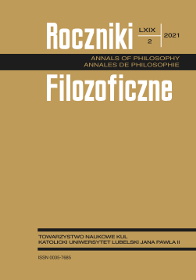Model duszy wieloczęściowej jako starożytny horyzont pytania o ludzką wolę w świetle Etyki nikomachejskiej 1111b i Politei 437B – 440D
The Model of the Multipartite Soul as the Antic Horizon of the Question of the Human Will in the Light of the Nicomachean Ethics 1111b and the Republic 437B – 440D
Author(s): Piotr PasterczykSubject(s): Philosophy, History of Philosophy, Ancient Philosphy
Published by: Towarzystwo Naukowe KUL & Katolicki Uniwersytet Lubelski Jana Pawła II
Keywords: will; soul; desire; decision; mind
Summary/Abstract: An analysis of the concept of resolution (προαίρεσις) and rational desire (βούλησις) in the third book of the Nicomachean Ethics 1111B leads Aristotle to discuss the problem of weakness of will (ἀκρασία) in the context of the relationship between reason, lust and anger. The philosophical source of the possibility of such a discussion is most likely the text of the fourth book of Politea, in which Plato founded the theory of the multipartite soul, thus making it possible to answer the question about the sources of motivation for human action that are different from reason. Thus, Plato resolves the aporia of Socratic intellectualism, in the light of which the reason responsible for human motivations is in contradiction to the phenomena of action devoid of the features of rationality and self-control. The juxtaposition of the text of Nicomachean Ethics 111B and Politea 437B–440D opens the horizon of the question about the possibility of the Platonic genesis of human volitional acts and, in the longer term, also the concept of human will. The fruit of this juxtaposition is an attempt to interpret the Platonic theory of the soul in the light of the Aristotelian concept of ὄρεξις, by means of which the Stagirite distinguishes three elements of the soul analogous to Platonic reason, lust and anger (λογισμός — ἐπιθυμία — βμολς), such as rational desire, θυμοειδές — ἐπιθυμητικόν). The perception of the possibility of the Platonic genesis of volitional acts defined later by Augustine in the context of the concept of the will (voluntas) is based on the finding of a relationship between rational desire interpreted by Aristotle as a volitional act (βούλησις) and Plato’s interpretation of reason not only as an intellect, but also as a dynamics that appears on the one hand in the form of erotic power (Symposium, Phaedrus) and on the other hand in the form of rational desire (Hippias Minor, Gorgias).
Journal: Roczniki Filozoficzne
- Issue Year: 69/2021
- Issue No: 2
- Page Range: 131-158
- Page Count: 28
- Language: Polish

